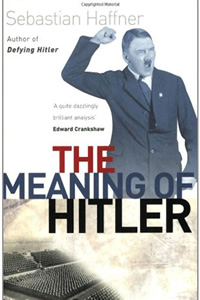"The Meaning of Hitler"
by Sebastian Haffner
 From the author of "Defying Hitler" – which i have yet to read – comes a fantastic insight into some of the ideology, concepts and underlying themes of Hitler’s political career. From successes to failures, his crimes against humanity and the great many misconceptions about one of Europe’s most infamous tyrants, Haffner's’s analysis of the meaning behind Hitler’s thoughts and actions are fascinating.
From the author of "Defying Hitler" – which i have yet to read – comes a fantastic insight into some of the ideology, concepts and underlying themes of Hitler’s political career. From successes to failures, his crimes against humanity and the great many misconceptions about one of Europe’s most infamous tyrants, Haffner's’s analysis of the meaning behind Hitler’s thoughts and actions are fascinating.
His chapter on Successes was spot on. If you use the basis of success (measured without any moral standpoint, successes being only viewed positively or negatively) Hitler’s list of Successes is somewhat incredible.
1930 – 8 times the vote achieved in the Reichstag
1932 – Doubles his vote again
1933 – Becomes Reich’s Chancellor and dissolves all political opposition
1934 – Becomes Reich’s President and Supreme Military Commander
1935 – General Conscription breaking the Treaty of Versailles
1936 - Remilitarisation of Rhineland
1938 – Annexation of Austria and gaining of Sudetenland
1939 – Poland defeated
1940 – France defeated in 6 weeks, occupies Denmark, Holland, Belgium, Norway, Luxembourg
1941 – Occupies Greece and Yugoslavia.
Then it all goes wrong… Russia…
"There is nothing comparable to that in history! Both in its rise and eventual fall."
The book is also an account of how Hitler did essentially very little of note for the first 30 years of his life, and yet the following 26 years literally changed world history to the point where most of the world’s nations centred their foreign policies around him. It also describes his (lack of a) personal life, his (lack of) relationships, and describes in detail how and why Hitler sought intentionally to destroy the German State and replace it with one thing. Himself.
Hitler left Germany on the 30th April 1945 with no successor and no Constitution, "destroying the state’s ability to function in favour of his personal omnipotence and irreplaceability" and giving him "completely unrestricted freedom of action in all directions."
Irrespective of his crimes against humanity, which have been documented by so many others, Haffner’s final chapter was for me the most interesting. Betrayal.
Hitler’s betrayal of the country that adopted him was in the end, truly horrific. When the war didn't’t go his way, and when the Russians were proving themselves (through truly mind-blowing loss of life) to be the eventual victors, Hitler decided that Germany was even too good for the Germans, and gave the order to destroy it himself. On the 18th March 1945 Hitler gave the order to destroy all Military, Transport, Communication, Industrial and Supply facilities. Anything the enemy could use, or may need in the future was to be destroyed. Hitler answering to questions by Speer
"If the war is lost, then the Nation will be lost as well… Because this nation has shown itself the weaker, and the future belongs exclusively to the stronger nation from the East. In any event, what remains after this struggle are only the inferior, for the good have all died in battle."
And after ordering the destruction of millions of people from all over Europe, and sending 5.5 million young German men to their deaths, he then plays the coward by committing suicide. His ultimate destruction of Germany was only thwarted by Albert Speer and many other Germans last minute attempts to sabotage Hitler‘s final orders.
The book ends with a quote I shall be using on tours at Dachau…
"Still less good is that since Hitler many Germans no longer dare to be patriots. For Germany history does not end with Hitler. Anyone believing that it does, and possibly even rejoicing at it, does not realise just how much he is thereby fulfilling Hitler’s last will and testament."
 From the author of "Defying Hitler" – which i have yet to read – comes a fantastic insight into some of the ideology, concepts and underlying themes of Hitler’s political career. From successes to failures, his crimes against humanity and the great many misconceptions about one of Europe’s most infamous tyrants, Haffner's’s analysis of the meaning behind Hitler’s thoughts and actions are fascinating.
From the author of "Defying Hitler" – which i have yet to read – comes a fantastic insight into some of the ideology, concepts and underlying themes of Hitler’s political career. From successes to failures, his crimes against humanity and the great many misconceptions about one of Europe’s most infamous tyrants, Haffner's’s analysis of the meaning behind Hitler’s thoughts and actions are fascinating.